Related Research Articles

Charles Sanders Peirce was an American scientist, mathematician, logician, and philosopher who is sometimes known as "the father of pragmatism". According to philosopher Paul Weiss, Peirce was "the most original and versatile of America's philosophers and America's greatest logician". Bertrand Russell wrote "he was one of the most original minds of the later nineteenth century and certainly the greatest American thinker ever".

In mathematical logic, Russell's paradox is a set-theoretic paradox published by the British philosopher and mathematician Bertrand Russell in 1901. Russell's paradox shows that every set theory that contains an unrestricted comprehension principle leads to contradictions. The paradox had already been discovered independently in 1899 by the German mathematician Ernst Zermelo. However, Zermelo did not publish the idea, which remained known only to David Hilbert, Edmund Husserl, and other academics at the University of Göttingen. At the end of the 1890s, Georg Cantor – considered the founder of modern set theory – had already realized that his theory would lead to a contradiction, as he told Hilbert and Richard Dedekind by letter.

Friedrich Ludwig Gottlob Frege was a German philosopher, logician, and mathematician. He was a mathematics professor at the University of Jena, and is understood by many to be the father of analytic philosophy, concentrating on the philosophy of language, logic, and mathematics. Though he was largely ignored during his lifetime, Giuseppe Peano (1858–1932), Bertrand Russell (1872–1970), and, to some extent, Ludwig Wittgenstein (1889–1951) introduced his work to later generations of philosophers. Frege is widely considered to be the greatest logician since Aristotle, and one of the most profound philosophers of mathematics ever.
Classical logic is the intensively studied and most widely used class of deductive logic. Classical logic has had much influence on analytic philosophy.
Foundations of mathematics is the study of the philosophical and logical and/or algorithmic basis of mathematics, or, in a broader sense, the mathematical investigation of what underlies the philosophical theories concerning the nature of mathematics. In this latter sense, the distinction between foundations of mathematics and philosophy of mathematics turns out to be vague. Foundations of mathematics can be conceived as the study of the basic mathematical concepts and how they form hierarchies of more complex structures and concepts, especially the fundamentally important structures that form the language of mathematics also called metamathematical concepts, with an eye to the philosophical aspects and the unity of mathematics. The search for foundations of mathematics is a central question of the philosophy of mathematics; the abstract nature of mathematical objects presents special philosophical challenges.
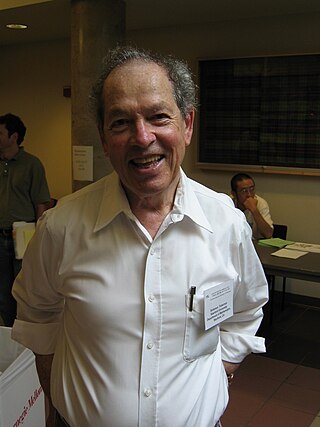
Solomon Feferman was an American philosopher and mathematician who worked in mathematical logic. In addition to his prolific technical work in proof theory, recursion theory, and set theory, he was known for his contributions to the history of logic and as a vocal proponent of the philosophy of mathematics known as predicativism, notably from an anti-platonist stance.
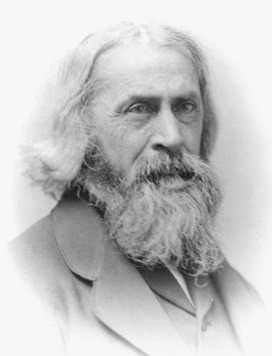
Benjamin Peirce was an American mathematician who taught at Harvard University for approximately 50 years. He made contributions to celestial mechanics, statistics, number theory, algebra, and the philosophy of mathematics.

Friedrich Wilhelm Karl Ernst Schröder was a German mathematician mainly known for his work on algebraic logic. He is a major figure in the history of mathematical logic, by virtue of summarizing and extending the work of George Boole, Augustus De Morgan, Hugh MacColl, and especially Charles Peirce. He is best known for his monumental Vorlesungen über die Algebra der Logik, in three volumes, which prepared the way for the emergence of mathematical logic as a separate discipline in the twentieth century by systematizing the various systems of formal logic of the day.

Louis Couturat was a French logician, mathematician, philosopher, and linguist. Couturat was a pioneer of the constructed language Ido.
In mathematics, logic and philosophy of mathematics, something that is impredicative is a self-referencing definition. Roughly speaking, a definition is impredicative if it invokes the set being defined, or another set that contains the thing being defined. There is no generally accepted precise definition of what it means to be predicative or impredicative. Authors have given different but related definitions.

Ivor Owen Grattan-Guinness was a historian of mathematics and logic.
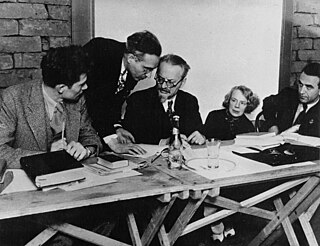
Jean Louis Maxime van Heijenoort was a historian of mathematical logic. He was also a personal secretary to Leon Trotsky from 1932 to 1939, and an American Trotskyist until 1947.
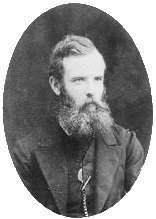
Hugh MacColl was a Scottish mathematician, logician and novelist.

This Charles Sanders Peirce bibliography consolidates numerous references to the writings of Charles Sanders Peirce, including letters, manuscripts, publications, and Nachlass. For an extensive chronological list of Peirce's works, see the Chronologische Übersicht on the Schriften (Writings) page for Charles Sanders Peirce.
In mathematical logic, algebraic logic is the reasoning obtained by manipulating equations with free variables.

On May 14, 1867, the 27–year-old Charles Sanders Peirce, who eventually founded pragmatism, presented a paper entitled "On a New List of Categories" to the American Academy of Arts and Sciences. Among other things, this paper outlined a theory of predication involving three universal categories that Peirce continued to apply in philosophy and elsewhere for the rest of his life. The categories demonstrate and concentrate the pattern seen in "How to Make Our Ideas Clear", and other three-way distinctions in Peirce's work.
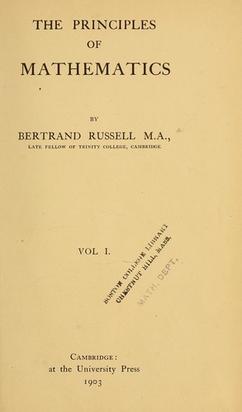
The Principles of Mathematics (PoM) is a 1903 book by Bertrand Russell, in which the author presented his famous paradox and argued his thesis that mathematics and logic are identical.
George Spencer-Brown was an English polymath best known as the author of Laws of Form. He described himself as a "mathematician, consulting engineer, psychologist, educational consultant and practitioner, consulting psychotherapist, author, and poet".
The type theory was initially created to avoid paradoxes in a variety of formal logics and rewrite systems. Later, type theory referred to a class of formal systems, some of which can serve as alternatives to naive set theory as a foundation for all mathematics.
Anita Burdman Feferman was an American historian of mathematics and biographer, known for her biographies of Jean van Heijenoort and of Alfred Tarski.
References
- 1 2 3 4 5 6 Irving H. Anellis (1946 – 2013) from Commens
- ↑ I.H. Anellis (June 1990) Introducing Modern Logic via Project Euclid
- ↑ The Review of Modern Logic via Project Euclid
- ↑ Hajnal Andréka, J. D. Monk & Istvan Nemeti editors (1991) Algebraic Logic, Colloquia Mathematica Societatis János Bolyai # 54, János Bolyai Mathematical Society & Elsevier ISBN 0444885439 Anellis & Houser essay in pages 1 to 36
- ↑ Jean-Yves Beziau (2000) Review of Logic and its History in the Work and Writings of Jean van Heijenoort Modern Logic 8: 105 to 117 via Project Euclid
- 1 2 Seminar series at Peirce Edition Project